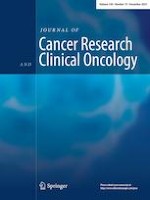Erschienen in:

13.10.2023 | Research
CCR5/CCL5 axis is linked to a poor outcome, and inhibition reduces metastasis in oral squamous cell carcinoma
verfasst von:
Wilfredo Alejandro González-Arriagada, Ricardo D. Coletta, Carlo Lozano-Burgos, Cynthia García, Jaime Maripillán, Francisca Alcayaga-Miranda, Bastián Godínez-Pacheco, Sebastián Oyarce-Pezoa, René Martínez-Flores, Isaac E. García
Erschienen in:
Journal of Cancer Research and Clinical Oncology
|
Ausgabe 19/2023
Einloggen, um Zugang zu erhalten
Abstract
Purpose
The CCR5/CCL5 axis is essential for interactions between malignant cells and microenvironment components, promoting tumor progression in oral squamous cell carcinoma (OSCC). This study aims to evaluate the association of CCL5 and CCR5 with the behavior of oral cancer and assess the therapeutic potential of a CCR5 antagonist.
Methods
A retrospective study to analyze CCR5 and CCL5 expression on paraffin-embedded tissues was performed. In cell lines, rhCCL5 was added to induce CCR5-related pathways, and Maraviroc and shRNA against CCR5 were used to neutralize the receptor. Finally, an in vivo murine orthotopic xenograft model of tongue cancer was used to evaluate Maraviroc as an oncologic therapy. After 15 days, the mice were killed, and the primary tumors and cervical lymph nodes were analyzed.
Results
The expression of CCR5 was associated with clinical stage and metastasis, and CCL5 was related to overall survival. Adding rhCCL5 induced cell proliferation, while shRNA and Maraviroc reduced it in a dose-dependent manner. Maraviroc treatment also increased apoptosis and modified cytoskeletal organization. In vivo, Maraviroc reduced neck metastasis.
Conclusions
The effects of CCR5 antagonists in OSCC have been poorly studied, and this study reports in vitro and in vivo evidence for the effects of Maraviroc in OSCC. Our results suggest that the CCR5/CCL5 axis plays a role in oral cancer behavior, and that its inhibition is a promising new therapy alternative.